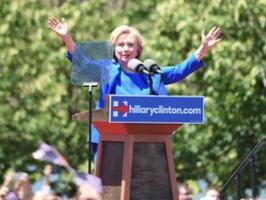Debate Time – Will Republicans Be Watching?
Much already has been made of the upcoming debates between the Republican candidates for president, but will GOP voters be tuning in? Are they ready for 20 or more debates like there were four years ago?
A new Rasmussen Reports national telephone survey finds that 90% of Likely Republican Voters say they are likely to watch at least some of the GOP candidate debates, with 64% who say it is Very Likely. Just nine percent (9%) say they are not very or Not At All Likely to watch. The first Republican debate is scheduled for tomorrow night.
But only 43% of Republicans say pre-primary debates are Very Important in determining how they will vote in their state party primary. Still, that compares to 34% of Democrats and 31% of voters not affiliated with either major party.
Among all voters, 79% say they are likely to watch at least some of the GOP debates, with 48% who say it is Very Likely. Eighteen percent (18%) are unlikely to do so, but that includes only six percent (6%) who are Not At All Likely to watch. Democrats are the least interested. (To see survey question wording, click here.)
Seventy-nine percent (79%) of all voters say pre-primary debates are important to their primary vote, with 36% who say they are Very Important. That’s up from 69% and 23% respectively just before the primaries in January 2012. Nineteen percent (19%) now say the debates are not important to how they vote in their state primary, but just five percent (5%) feel debates are Not At All Important to their vote.
Fox News announced late yesterday the lineup for the first Republican presidential debate. Rasmussen Reports announced the same lineup last Thursday morning.
(Want a free daily e-mail update? If it's in the news, it's in our polls). Rasmussen Reports updates are also available on Twitter or Facebook.
The survey of 1,000 Likely Voters was conducted on July 28-29, 2015 by Rasmussen Reports. The margin of sampling error is +/- 3 percentage points with a 95% level of confidence. Field work for all Rasmussen Reports surveys is conducted by Pulse Opinion Research, LLC. See methodology.
In mid-June when several candidates still had not yet declared, 53% of Republicans wanted all the challengers on the debate stage at the same time, while 39% wanted to limit the number appearing. Fox is having a shorter second debate tomorrow with the candidates who are second-tier poll-wise.
In the race for the 2012 Republican presidential nomination, nearly 20 debates were held before the first state primary. Fifty-eight percent (58%) of GOP voters feel that was too many. Just seven percent (7%) say there weren’t enough debates, while 27% believe the number was about right.
Among all voters, 56% say 20 debates was too many; eight percent (8%) say not enough, and 29% feel the number of debates was about right.
In January 2012, 45% of all voters – and 39% of Republicans – felt there had been too many debates
Sixty percent (60%) of all voters agree that, generally speaking, political primaries are a good way for a political party to pick its nominee. That’s up from 40% a year ago. Eighteen percent (18%) disagree, while slightly more (22%) are not sure.
Republicans (70%) support party primaries more strongly than Democrats (64%) and unaffiliated voters (48%) do.
Donald Trump is the leader among the Republican candidates at this point, but he has just 25% support. So this race has just begun.
There’s still not much of a contest on the Democratic side, though, with former Secretary of State Hillary Clinton far ahead of her challengers.
Over a third (36%) of Republicans and 19% of Democrats say they are likely to vote for Trump if he loses the GOP nomination battle and runs as a third-party candidate.
Here’s how all the presidential hopefuls stack up so far.
Additional information from this survey and a full demographic breakdown are available to Platinum Members only.
Please sign up for the Rasmussen Reports daily e-mail update (it’s free) or follow us on Twitter or Facebook. Let us keep you up to date with the latest public opinion news.
The survey of 1,000 Likely Voters was conducted on July 28-29, 2015 by Rasmussen Reports. The margin of sampling error is +/- 3 percentage points with a 95% level of confidence. Field work for all Rasmussen Reports surveys is conducted by Pulse Opinion Research, LLC. See methodology.
Rasmussen Reports is a media company specializing in the collection, publication and distribution of public opinion information.
We conduct public opinion polls on a variety of topics to inform our audience on events in the news and other topics of interest. To ensure editorial control and independence, we pay for the polls ourselves and generate revenue through the sale of subscriptions, sponsorships, and advertising. Nightly polling on politics, business and lifestyle topics provides the content to update the Rasmussen Reports web site many times each day. If it's in the news, it's in our polls. Additionally, the data drives a daily update newsletter and various media outlets across the country.
Some information, including the Rasmussen Reports daily Presidential Tracking Poll and commentaries are available for free to the general public. Subscriptions are available for $4.95 a month or 34.95 a year that provide subscribers with exclusive access to more than 20 stories per week on upcoming elections, consumer confidence, and issues that affect us all. For those who are really into the numbers, Platinum Members can review demographic crosstabs and a full history of our data.
To learn more about our methodology, click here.




